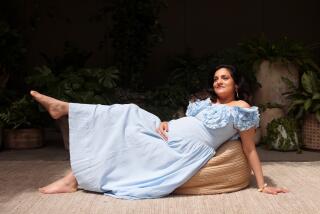The Inner Mullah Shouts, but He’s No Cheerleader
- Share via
After living several months with Muslims in rural Pakistan last year, I saw the birth of my inner mullah. And it hasn’t gone away.
By “mullah,” I mean the leaders who want to tie Pakistan and the Muslim world to a strict reading of Islamic law. I mean the people who were restrained by police last weekend in Lahore as hundreds of women staged a historic run for women’s rights, jogging in street clothes and even high heels through the city.
Women in sports isn’t un-Islamic, the runners said. But my inner mullah missed their message completely. “Look at those city women allowed to run wild,” it said. “Their hair is loose, and their bosoms are bouncing. Strange men are watching. What do these women want to say?”
This inner mullah is a collection of voices I heard in rural Pakistan, both male and female, polite but assured -- the echo of status quo. When Laura Bush emerged from a mosque in Jerusalem to a crowd of shouting protesters, it said, “Silly woman. A mosque is only for men. And pull up that head scarf to cover your hair. How can anyone listen to you when you have no shame?”
Of course, I don’t agree with this mullah of mine. Not anymore. But if an American, non-Muslim woman who calls herself open-minded can grow this kind of voice, imagine the challenge of changing the mind of the average Pakistani.
Here’s what happened. I lived and taught English in the conservative Northwest Frontier Province, in a village near Afghanistan. The province is Pakistan’s most Taliban-friendly, controlled by a political party called the Muttahida Majlis-i-Amal (MMA). The MMA wants to spread to other parts of Pakistan, which explains why it protested against women running in Lahore. The MMA knows, and is proud of the fact, that a rural woman hardly appears in public at all.
Strangely, it was these women who guided my inner mullah into place.
The few female students at my nearby school were the first to make me properly shapeless in a long, loose head scarf. The older ones were shy and slightly wary judges, pointing out my rights and wrongs. “She talks with the boys during recess,” they told the principal. “We don’t do that.”
My host family said I shouldn’t leave the house without an escort, and in the nearby town, I was the only woman on the streets.
Meanwhile, neighbors clucked at Pakistani television’s female announcers, with their head scarves hardly covering their bouffant hairdos, exposing their faces to the world. “Karachi, Lahore,” the local women murmured, mixing wonder and disapproval.
In time, I understood: As a woman, I was a powerful distraction, and I had to protect myself accordingly. A woman’s extreme seclusion was a kind of self-respect.
On my rare days in town, I walked the streets quickly, trying to avoid men’s eyes. I saw the rare female tourist in cargo pants and tiny head scarf and wanted to warn her: Those pants still reveal the curve of your legs, and that scarf doesn’t cover your chest. You might be educated and independent, but you look like a hooker. Who would look past that to hear your Western point of view?
When I finally left the frontier for the capital, Islamabad, I turned this new thinking on myself.
Islamabad once had seemed the ultimate conservative city. Now it rocked. Women in the upscale shopping centers walked unescorted in jeans and makeup, slender scarves hanging loose, their long hair bare.
“You can take off your head scarf,” said my host, an overseas-educated Pakistani woman. “You can even wear a T-shirt in the bazaar if you like.”
“Why don’t I just go naked?” I thought, my inner mullah speaking. I imagined men looking at my bare arms and felt queasy. In a culture that gave women few rights or freedoms, I’d come to see my value in terms of body, of skin. I couldn’t so easily give it away to strangers.
When I returned to school and told my students, the girls congratulated me. “Good, Madam,” they said. “You are learning.”
The women who were running for rights in Pakistan have a long road ahead. The mullahs shouting from the barricades are the first of their challenges. The next is Pakistani women themselves, the large majority rural and two-thirds of them unschooled.
Like my new inner mullah, they’ve been raised under the ancient twin virtues of honor and concealment. To reach them, female activists should leave their city stunts and go village to village. Instead of sports, they should talk real justice. Instead of sneakers, they should wear their nicest shoes.
I’m sure few women in rural Pakistan saw the Lahore run as a symbol of freedom. Like men, like me, used to judging by appearance, they were only staring at the runners’ legs.
More to Read
Sign up for Essential California
The most important California stories and recommendations in your inbox every morning.
You may occasionally receive promotional content from the Los Angeles Times.










